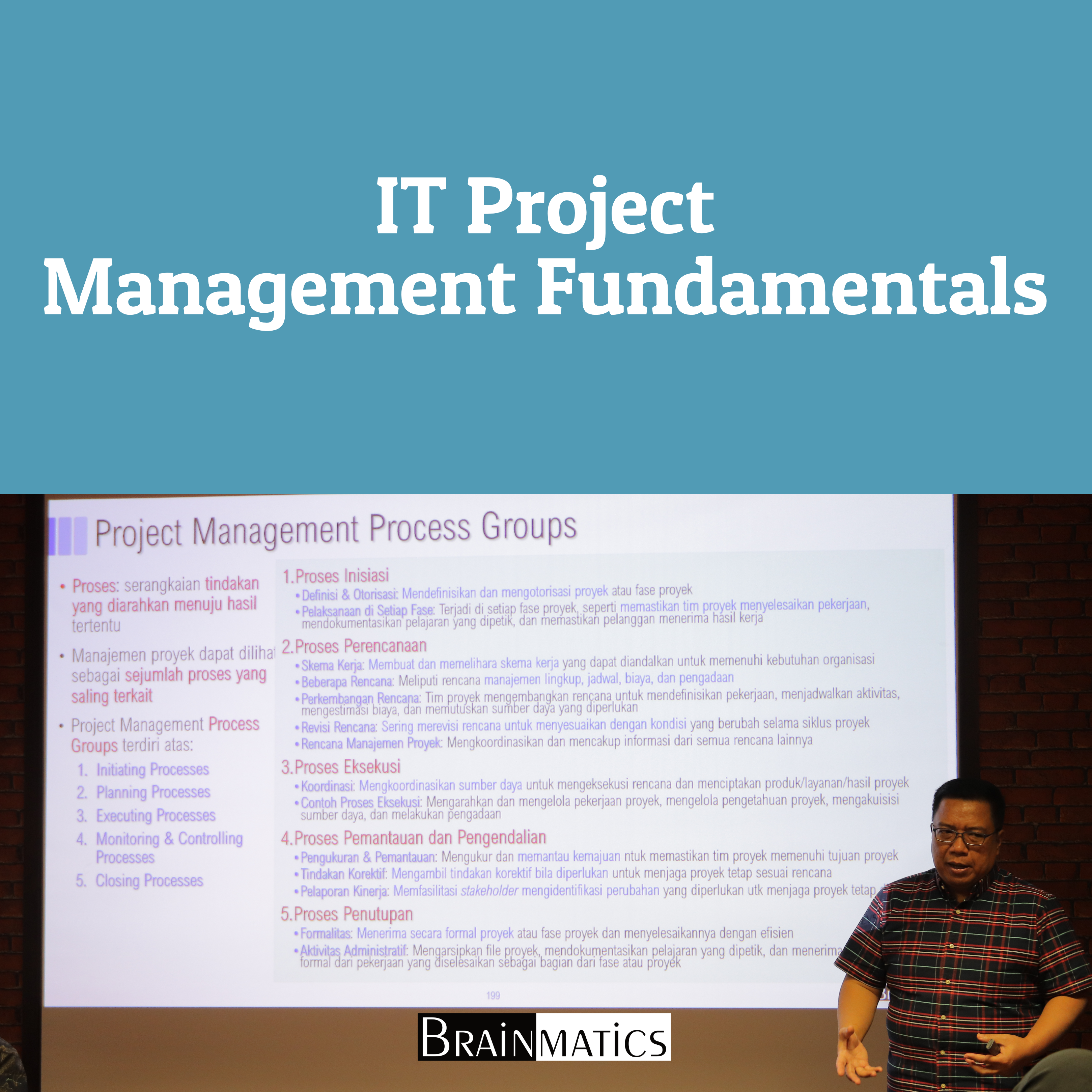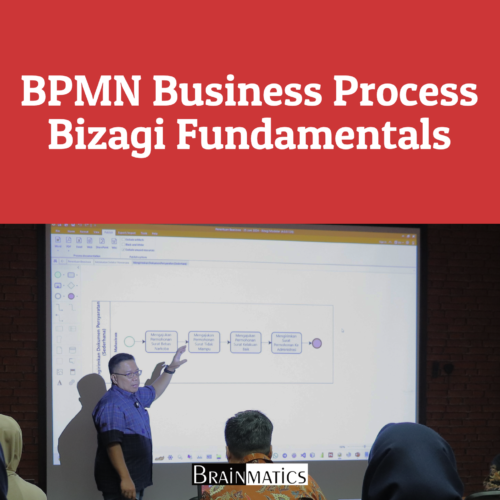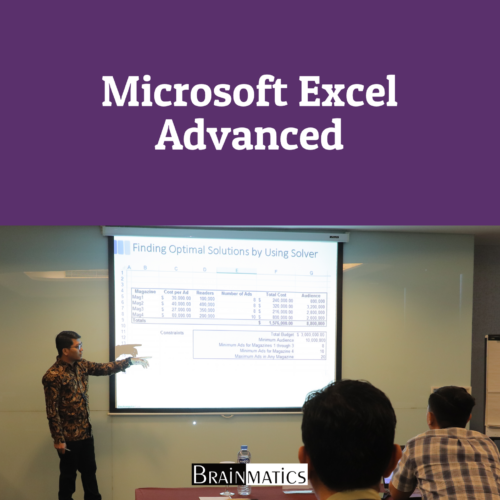 IT Project Management Fundamentals sangat penting untuk dipahami oleh project manager. Pelaksanaan proyek teknologi informasi masih banyak menemui kegagalan. Menurut survei yang dilakukan oleh Project Management Institute, rata-rata tingkat keberhasilan proyek untuk selesai tepat waktu, sesuai anggaran, dan menjawab kebutuhan mencapai 60% (Project Management Institute, 2018). Data tersebut merupakan hasil survei pada organisasi yang dikategorikan sebagai underperformers. Melihat data tersebut, IT project management sangat penting untuk dipahami oleh project manager. IT project management yang baik dapat memaksimalkan sumber daya, memperbaiki relasi dengan konsumen, menekan biaya, menaikkan produktifitas, menaikkan laba, dan meningkatkan kesuksesan pelaksanaan proyek (Schwalbe, 2014).
IT Project Management Fundamentals sangat penting untuk dipahami oleh project manager. Pelaksanaan proyek teknologi informasi masih banyak menemui kegagalan. Menurut survei yang dilakukan oleh Project Management Institute, rata-rata tingkat keberhasilan proyek untuk selesai tepat waktu, sesuai anggaran, dan menjawab kebutuhan mencapai 60% (Project Management Institute, 2018). Data tersebut merupakan hasil survei pada organisasi yang dikategorikan sebagai underperformers. Melihat data tersebut, IT project management sangat penting untuk dipahami oleh project manager. IT project management yang baik dapat memaksimalkan sumber daya, memperbaiki relasi dengan konsumen, menekan biaya, menaikkan produktifitas, menaikkan laba, dan meningkatkan kesuksesan pelaksanaan proyek (Schwalbe, 2014).
Project manager harus mampu memahami dan mampu menerapkan knowledge areas dari IT project management. Knowledge areas ini terdiri atas 10 kompetensi utama. Kompetensi utama ini meliputi project scope, time, cost, quality, human resource, communication, risk, procurement, stakeholder, dan integration management (Schwalbe, 2014). Selain itu project manager harus memahami 5 process group yang ada pada IT project management. Process group ini terdiri atas initiating, planning, executing, monitoring and controlling, dan closing. Untuk memahami dasar-dasar ini secara lebih sederhana, Anda dapat merujuk pada materi #PMBOK – Principles & Performance Domains – 1 Hour Online Training sebagai gambaran awal.
Course IT Project Management Fundamentals membahas 10 Project Management Knowledge Area dan 5 Process Group secara mendalam. Materi dilengkapi dengan studi kasus dari berbagai sumber, serta wawasan tambahan mengenai 5 Faktor Kegagalan Penerapan PMBOK – 1 Hour Online Training untuk menghindari risiko kegagalan proyek. Setelah menyelesaikan course ini, peserta siap menghadapi tantangan dalam pelaksanaan proyek. Untuk memperdalam keahlian dan meningkatkan kompetensi sebagai project manager yang lebih expert, peserta dapat melanjutkan ke course IT Project Management Advanced.
OBJECTIVES
1. Memahami IT Project Management
2. Memahami process group pada IT Project Management
3. Memahami dan menerapkan knowledge area pada IT Project Management
AUDIENCE
1. IT Project Manager
2. IT Manager
3. Staf yang terlibat dalam IT project
PREREQUISITES
Tidak ada training khusus yang dipersyaratkan
CONTENT
1. Introduction to Project Management
1.1. Project Overview
1.2. Project Management Overview
1.3. Program and Project Portfolio Management
1.4. The Role of the Project Manager
1.5. The Project Management Profession
2. The Project Management and Information Technology Context
2.1. A System View of Project Management
2.2. Understanding Organizations
2.3. Stakeholder Management
2.4. Project Phase and the Project Life Cycle
2.5. The Context of Information Technology Projects
2.6. Recent Trends Affecting Information Technology Project Management
3. The Project management Process Groups: A Case Study
3.1. Project Management Process Groups
3.2. Mapping the Process Groups to the Knowledge Areas
3.3. Developing an Information Technology Project
3.4. Management Methodology
4. Project Integration Management
4.1. Project Integration Management Overview
4.2. Developing a Project Charter
4.3. Developing a Project Management Plan
4.4. Directing and Managing Project Execution
4.5. Monitoring and Controlling Project Work
4.6. Performing Integrated Change Control
4.7. Closing Projects or Phases
4.8. Using Software to Assist in Project Integration Management
5. Project Scope Management
5.1. Project Scope Management Overview
5.2. Collecting Requirements
5.3. Defining Scope
5.4. Creating the Work Breakdown Structure
5.5. Verifying Scope
5.6. Controlling Scope
5.7. Using Software to Assist in Project Scope Management
6. Project Time Management
6.1. The Importance of Project Schedules
6.2. Defining Activities
6.3. Sequencing Activities
6.4. Estimating Activity Resources
6.5. Estimating Activity Durations
6.6. Developing the Schedule
6.7. Controlling the Schedule
7. Project Cost Management
7.1. The Important of Project Cost Management
7.2. Basic Principles of Cost Management
7.3. Estimating Costs
7.4. Determining the Budget
7.5. Controlling Costs
8. Project Quality Management
8.1. The Importance of Project Quality Management
8.2. What is Project Quality Management
8.3. Planning Quality
8.4. Performing Quality Assurance
8.5. Performing Quality Control
8.6. Tools and Techniques for Quality Control
8.7. Modern Quality Management
8.8. Improving Information Technology Project Quality
9. Project Human Resource Management
9.1. The Importance of Human Resource Management
9.2. What is Project Human Resource Management
9.3. Keys to Managing People
9.4. Developing the Human Resource Plan
9.5. Acquiring the Project Team
9.6. Developing the Project Team
9.7. Managing the Project Team
10. Project Communications Management
10.1. The Importance of Project Communications Management
10.2. Identifying Stakeholders
10.3. Planning Communications
10.4. Distributing Information
10.5. Managing Stakeholders
10.6. Reporting Performance
10.7. Suggestions for Improving Project Communications
11. Project Risk Management
11.1. The Importance of Project Risk Management
11.2. Planning Risk Management
11.3. Common Sources of Risk on Information Technology Projects
11.4. Identifying Risks
11.5. Performing Qualitative Risk Analysis
11.6. Performing Quantitative Risk Analysis
11.7. Planning Risk Responses
11.8. Monitoring and Controlling Risks
12. Project Procurement Management
12.1. The Importance of Project Procurement Management
12.2. Planning Procurement
12.3. Conducting Procurements
12.4. Administering Procurements
13. Project Stakeholder Management
13.1. The Importance of Project Stakeholder Management
13.2. Identifying Stakeholders
13.3. Planning Stakeholder Management
13.4. Managing Stakeholder Engagement
13.5. Controlling Stakeholder Engagement
13.6. Using Software to Assist in Project Stakeholder Management
Course Features
- Lectures 16
- Quizzes 2
- Duration 32 hours
- Skill level All levels
- Language Indonesia
- Students 212
- Certificate Yes
- Assessments Yes
Online
- Start Date 29 September 2025
- End Date 2 Oktober 2025
- Cost Rp6.900.000,-
- Registered 1 Person
- Confirmed 1 Person Daftar
Offline
- Start Date 29 September 2025
- End Date 2 Oktober 2025
- Cost Rp7.900.000,-
- Registered 1 Person
- Confirmed 1 Person Daftar








